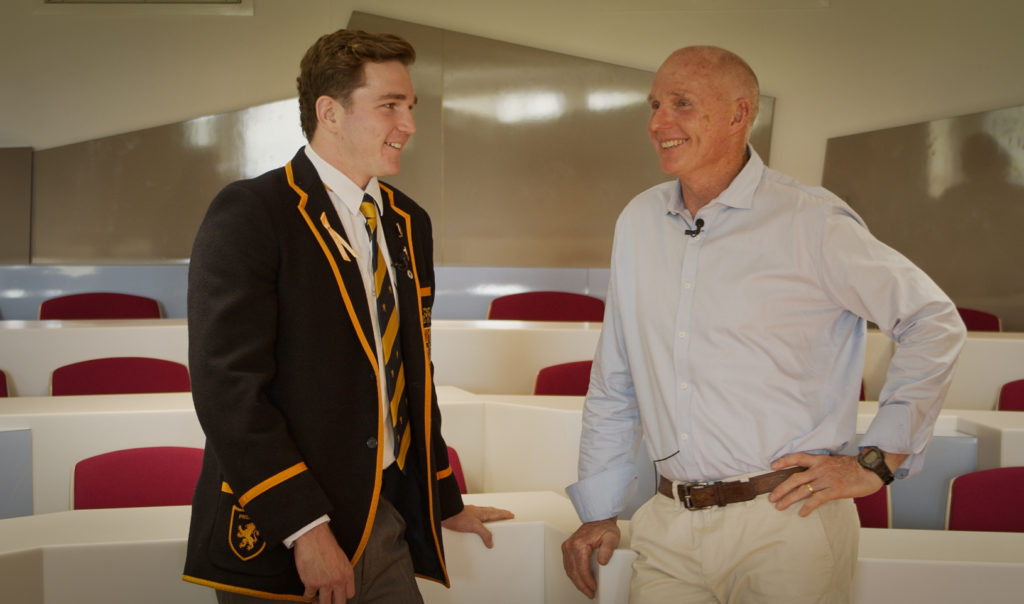A young man’s perception of what it means to ‘be’ a man is important. What boys imagine, fear and hope for affects them, beginning in childhood through to adulthood and –ultimately – throughout their lives. A positive concept of manhood, in its broadest sense, improves wellbeing, strengthens relationships and deepens community connection. It is well known that the social pressures young Australian men experience have an impact on their mental and physical health, their patterns of behaviour, and how they interact with and perceive the support available to them.
Since 2019, a significant and compelling Year 12 task in The Scots College Christian Studies assessment has included personal research requiring a student to reflect on their own experiences and interview a significant male figure in their life (usually their father). It is a direct attempt to encourage students to closely explore a well-known males’ journey into manhood, and to understand more about what being a man entails throughout his life.
Boys have been inspired and challenged. It is a real – and highly unique – opportunity to hear a trusted, older male’s story. It invites deeply contemplative and considered conversation between the two people involved.
Father and son participants, Dirk and Dylan Hansen, participated in 2020 and spoke about their experiences.
Dylan: “It was good to get some insight from Dad who has been, probably, the main role model in my entire life. Just sitting down to talk about that [the journey into manhood] has been a bit weird at the start, but yeah it was a good experience.
“It was interesting thinking to myself, ‘Well why is that like that, and what is Dad’s actual viewpoint on that? And how has he gotten to that viewpoint?’…”
Dirk: “… They’re conversations on the way to school, on the way to sport, that we’ve had many, many times before. When a situation might occur, and we hear the ways someone reacts to something, I give him my view on how I think that could have been handled or should have been handled. So, I think a lot of it had already been discussed, it was just interesting sitting down and actually doing it in a formal manner.”
Conversational insight
For research purposes, three Year 12 classes were selected to take part in the research study in Term 4 2019, then again during 2020. They spanned a range of academic levels.
The project required two sets of information to be gathered. Boys were asked to complete a survey of their own (10 to 15 questions). The second part was to interview their father (or other significant male) and ask similar questions of them. All participants received an information statement, including opt-out consent.
Who are men’s role models?
Boys most often identified their father as their most important role model. Their mother or grandparents were mentioned equally as often as sports players and teachers. Older brothers were mentioned slightly less often. The most common role models for fathers were their grandfather, mother, teacher, a work colleague or a sports figure.
Defining moments
Half the boys considered that they were still on the journey towards becoming a man, although many acknowledged that Glengarry [Scots’ compulsory Year 9 six-month outdoor education program at the Kangaroo Valley campus] was a key milestone in the journey. Most fathers reflected that providing for themselves and/or their family was a defining moment of manhood, while others considered completing school a key point in their lives.
Boys’ descriptions of being a man emphasised personal character qualities (e.g. being dependable with responsibility, caring for themselves and others, owning their mistakes), and prioritised mental health and character strength over physical prowess. Fathers, similarly, mentioned taking responsibility for themselves and others, protecting people and being a responsible member of society.
The research presented two compelling findings:
- Boys and fathers agree that manhood is fundamentally about solid character values, not the stereotypical factors of physical size and strength. Key character qualities included integrity, respect, loyalty, compassion and caring for others.
- Boys and their fathers both considered that the hardest things about being a man are living up to societal expectations of being strong, tough, emotionally invulnerable and not making mistakes.
Strong, gentle men
Dirk and Dylan Hansen both spoke about how they valued strong relationships (that they could rely on) and also the value of being an example to others:
Dylan: “Sports and [school] mates – they are the areas where I’ve really come to know people the best and really built strong friendships … If I ever have to reach out, they are probably the first people I can really trust and rely on from having built good relationships. They are probably the first people I’d reach out to and I’d feel very comfortable if they wanted to reach out to me.
“Something I’ve always learnt, going through school and from these discussions is that, you can’t always make everyone happy, but something that you should try and do as a man is just always have integrity in what you do. If what you’re doing is integral to your values and the values that you think are right, then there’s not much more you can do than that. So, it might not make everyone happy, but if that’s what you think is the right thing to do, then there’s probably a good chance that what you’re doing is right.”
Dirk: “It’s too easy to get misled as to what it means to be a man. I know when I grew up and I went to school, you would generally talk about being a man… [as] being tough, sometimes uncompromising, but that’s not what it is … Toughness is a lovely trait to have, but kindness is a better trait. A lot of people think kindness is weakness … You can be very kind and still be brutally tough.”
The Manhood project was conducted by the research department of The Scots College, Research Office. Former Research Projects Officer, Ms Rachel Pan, collected and interpreted initial data, with support from Mr Jeffrey Mann, Coordinator of Student Experience.

For more information about the Christian Studies Manhood research discussion task, you are welcome to contact The Scots College’s Coordinator of Student Experience, Mr Jeffrey Mann on 02 9391 7600.






